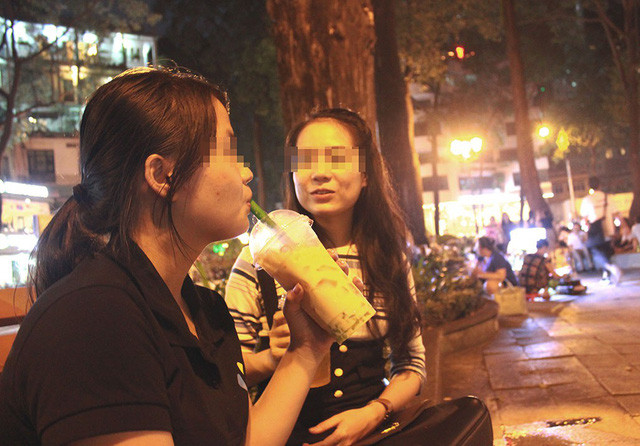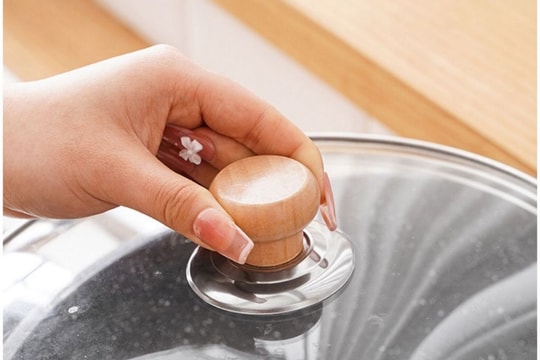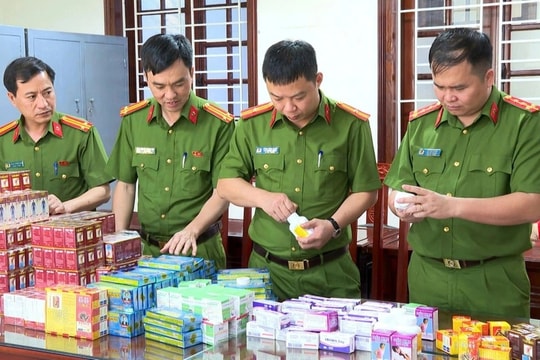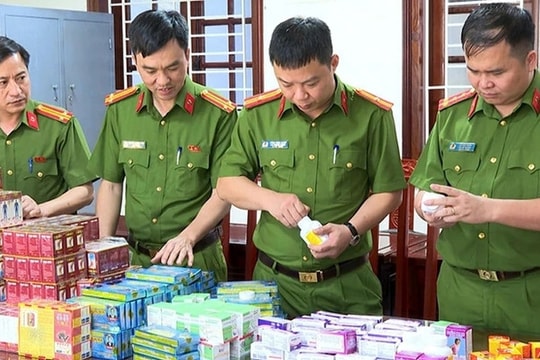Concerns about the risk of aging and infertility from milk tea
Many milk tea ingredients are fake or of unknown origin. In addition, "genuine" milk tea itself can cause aging and infertility...

A girl drinks a giant cup of milk tea sold for 12,000 VND at Turtle Lake area, Ho Chi Minh City. Photo: Manh Khang
Over the past 20 days, Hanoi Market Management has discovered two very large batches of milk tea ingredients of unknown origin.
The latest case was discovered on January 15, when teams 1 and 6 of Hanoi Market Management coordinated with Tu Liem District Police to inspect the warehouse of Heekcaa VN Company Limited in Nam Tu Liem District.
At the time of inspection, market management discovered over 220 250g tea bags, 630 unlabeled semi-finished product packages, and 1,200 original packages of foreign "cjwx" brand. About half of these had their packaging torn off to be repackaged and labeled as made in Vietnam, along with many 5kg cans of condensed milk bearing foreign brands. The owner of this shipment has not been able to present invoices or documents for many items in the shipment.
Counterfeit goods, goods of unknown origin
Mr. Hoang Dai Nghia, captain of market management team No. 6 in Hanoi, said that the inspected facility was selling pearl milk tea and among the inspected items, some had invoices and documents, while the items without invoices and documents were being detained.
"This company's behavior shows signs of trading in counterfeit goods and the authorities are evaluating the shipment. For the act of trading in counterfeit food, if the value of the shipment is over 30 million VND, it will be transferred for consideration of criminal prosecution," said Mr. Nghia.
According to the representative of the National Institute for Food Safety Control, it is advisable to test a large quantity of milk tea for evaluation because the majority of milk tea users are students. "If the product contains chemicals or has quality problems, it is feared that it will affect the race and health of the children" - Mr. Nghia suggested.
At the wholesale headquarters of confectionery, additives, and ingredients for the food and beverage industry on Hang Buom Street (Hanoi), black tea, milk powder, and tapioca pearls - ingredients of milk tea imported illegally and of unknown origin - have long been sold very commonly.
According to many recipes shared on the Internet and "advice" from grocery store owners in Binh Tay market (District 6, Ho Chi Minh City), if you want to make milk tea profitably, you should not mix it with fresh milk or condensed milk but use cream powder and other cheap ingredients. All the products introduced are of unknown origin and have no labels.
Do not drinkeveryday
Nutritionist Tran Lan Huong is also concerned about milk tea, because the large amount of sugar in the product can increase the risk of overweight and obesity in students.
Nowadays, the market is flooded with milk tea services. From branded milk tea to milk tea carts, although the price varies from student level 12,000 - 15,000 VND/cup or expensive 50,000 - 60,000 VND/cup, a lot of students buy.
Regarding the nutritional content of milk tea, Dr. Tran Thi Minh Hanh - Deputy Director of the Ho Chi Minh City Nutrition Center - immediately emphasized: "Milk tea is just a delicious drink and should not be considered a type of "milk" to drink every day."
Dr. Minh Hanh analyzed that milk tea has main ingredients of tea bags, cream powder, sugar or syrup and may have other ingredients such as jelly, pearls, flan, cheese... Although called milk tea, the ingredients almost do not contain fresh milk so it does not provide nutrients like milk. Cream powder contains mainly fat and little protein. If you drink a lot of milk tea, it will easily lead to overweight, obesity and fatigue.
Dr. Tran Ngoc Luu Phuong - Head of the Interventional Gastroenterology Unit at Nguyen Tri Phuong Hospital, Ho Chi Minh City - said that each cup of milk tea has an energy intake of 500 - 600 kilocalories, equivalent to more than a bowl of rice with vegetables and meat. However, it is enough in energy but lacking in nutrition, not providing protein, vitamins, minerals, fiber...
"The tapioca pearls in milk tea contain starch. When eaten, they will clump together, causing the body to process and digest slowly, leading to a bloated stomach and not feeling hungry. Drinking milk tea is already lacking in nutrition, and skipping meals will further unbalance the nutrition," said Dr. Phuong.
Risk of aging and infertility
According to Dr. Luu Phuong, being "addicted" to milk tea means taking in a large amount of sugar into the body for a long time. This potentially increases the risk of diabetes, high blood pressure, blood fat, and causes cells to age quickly... The sugar in milk tea is often chemical sugar combined with flavorings and additives. Although these substances are on the list of substances allowed for use in food, consuming too much every day is not good.
Dr. Luu Phuong said that in some countries, milk tea has been found to contain maleic acid, which causes kidney failure and infertility. The tapioca pearls in milk tea are made from polymers, which the body cannot absorb or excrete. Drinking a lot of tea will limit the absorption of iron. Tea and milk combined will precipitate the protein in the milk, making it difficult for the body to absorb nutrients from milk.
Expired milk tea ingredients
Mr. Tran Truong Chinh, deputy chief inspector of Can Tho Department of Health, said that through a recent food safety inspection of milk tea businesses in the area, violations of milk tea businesses include unsanitary conditions and brewing tools, small-scale trading without food safety certificates, use of expired milk tea ingredients, ingredients of unknown origin, and failure to conduct health checks for employees...
Regarding the process of making milk tea, with many diverse ingredients, homemade or imported (mainly from Taiwan, China), if food safety is not followed, poisoning can easily occur...




